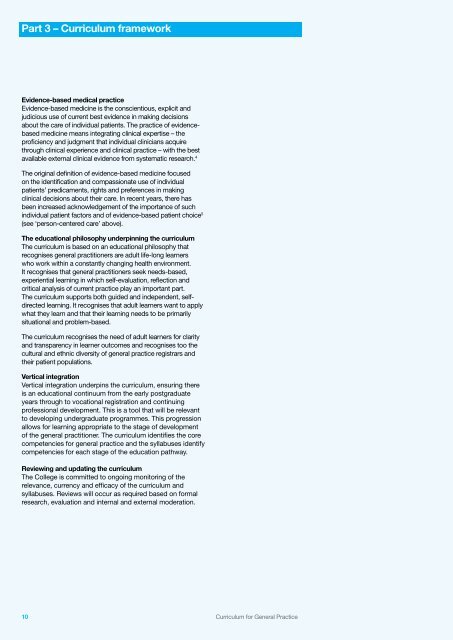Curriculum for General Practice - The Royal New Zealand College ...
Curriculum for General Practice - The Royal New Zealand College ...
Curriculum for General Practice - The Royal New Zealand College ...
You also want an ePaper? Increase the reach of your titles
YUMPU automatically turns print PDFs into web optimized ePapers that Google loves.
Part 3 – <strong>Curriculum</strong> framework<br />
Evidence-based medical practice<br />
Evidence-based medicine is the conscientious, explicit and<br />
judicious use of current best evidence in making decisions<br />
about the care of individual patients. <strong>The</strong> practice of evidencebased<br />
medicine means integrating clinical expertise – the<br />
proficiency and judgment that individual clinicians acquire<br />
through clinical experience and clinical practice – with the best<br />
available external clinical evidence from systematic research. 4<br />
<strong>The</strong> original definition of evidence-based medicine focused<br />
on the identification and compassionate use of individual<br />
patients’ predicaments, rights and preferences in making<br />
clinical decisions about their care. In recent years, there has<br />
been increased acknowledgement of the importance of such<br />
individual patient factors and of evidence-based patient choice 5<br />
(see ‘person-centered care’ above).<br />
<strong>The</strong> educational philosophy underpinning the curriculum<br />
<strong>The</strong> curriculum is based on an educational philosophy that<br />
recognises general practitioners are adult life-long learners<br />
who work within a constantly changing health environment.<br />
It recognises that general practitioners seek needs-based,<br />
experiential learning in which self-evaluation, reflection and<br />
critical analysis of current practice play an important part.<br />
<strong>The</strong> curriculum supports both guided and independent, selfdirected<br />
learning. It recognises that adult learners want to apply<br />
what they learn and that their learning needs to be primarily<br />
situational and problem-based.<br />
<strong>The</strong> curriculum recognises the need of adult learners <strong>for</strong> clarity<br />
and transparency in learner outcomes and recognises too the<br />
cultural and ethnic diversity of general practice registrars and<br />
their patient populations.<br />
Vertical integration<br />
Vertical integration underpins the curriculum, ensuring there<br />
is an educational continuum from the early postgraduate<br />
years through to vocational registration and continuing<br />
professional development. This is a tool that will be relevant<br />
to developing undergraduate programmes. This progression<br />
allows <strong>for</strong> learning appropriate to the stage of development<br />
of the general practitioner. <strong>The</strong> curriculum identifies the core<br />
competencies <strong>for</strong> general practice and the syllabuses identify<br />
competencies <strong>for</strong> each stage of the education pathway.<br />
Reviewing and updating the curriculum<br />
<strong>The</strong> <strong>College</strong> is committed to ongoing monitoring of the<br />
relevance, currency and efficacy of the curriculum and<br />
syllabuses. Reviews will occur as required based on <strong>for</strong>mal<br />
research, evaluation and internal and external moderation.<br />
10<br />
<strong>Curriculum</strong> <strong>for</strong> <strong>General</strong> <strong>Practice</strong>

















